Living and working in Toronto, there’s no shortage of women entrepreneur conferences and meetups.
I used to go to all of them, but quickly realized that although these spaces were supposed to be for women like me - girl bosses or women CEOs or whatever you’d like to call us - at the end of the day, you really can’t lump all women-owned businesses together.
Like in any community, there are nuances and differences and some stories that get pushed to the margins.
The margins. This is often where I find myself in these spaces.
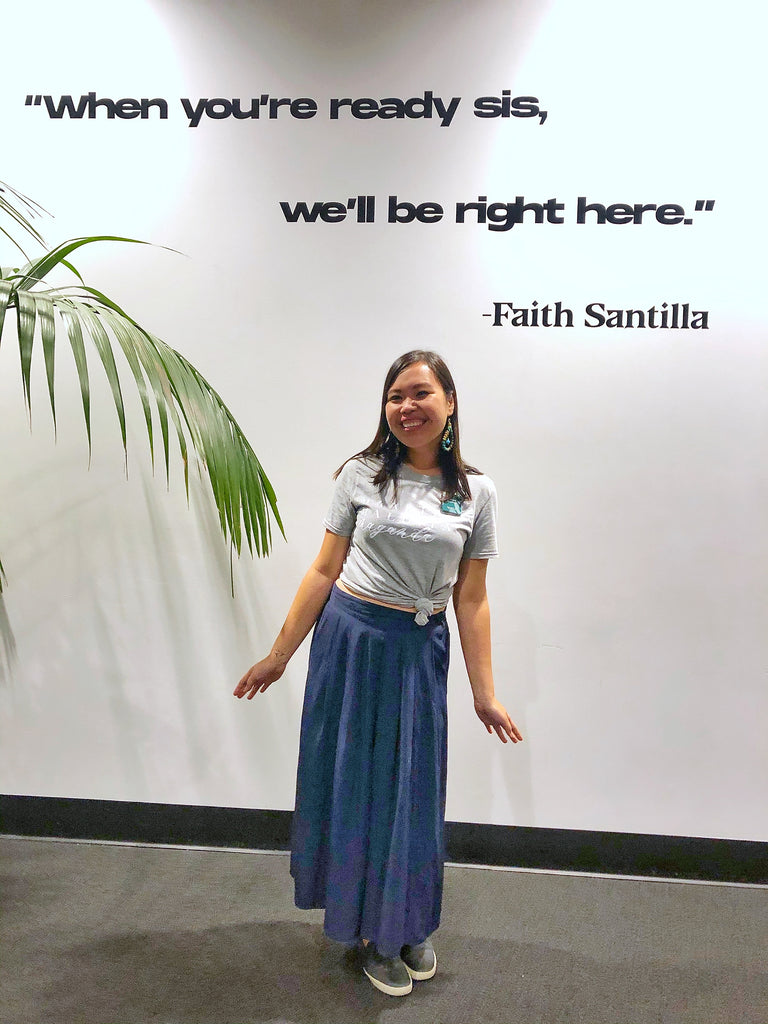
The Pinayista Summit is a community gathering about entrepreneurship, feminism, Filipino culture, and so much more. Me, Gelaine, standing beneath Faith Santilla's iconic words, calling us to support one another through sisterhood.
Much of the time, although the attendees themselves may come from more diverse backgrounds, the panelists and speakers and organizers are mostly white. This is *especially* true in the sustainability and ethical fashion scenes, which has been so notoriously white that it spurred the hashtag #10x10representationmatters and social media accounts like @browngirl_green to pop up.
In an industry where most artisan brands are run by well-meaning white folks hoping to help brown and black people by catering to affluent white customers, we wanted to do something different.
Together, my husband and I co-founded our own ethical fashion company called Cambio & Co. We work with artisans in the Philippines to celebrate Filipino craftsmanship, culture, and heritage.
Our customers are Filipino millennials in the diaspora - people who want to feel a little closer to our heritage, see ourselves reflected in what we buy, and feel proud to wear a piece of our culture on a day to day basis. We don’t pander to white folk or wash down our marketing and storytelling to appeal to this generic creature called ‘the mass market’. Instead, we’re unapologetic about sharing Filipino stories, told by Filipinos themselves.
When I attend these women entrepreneur summits and explain what we do, I’m met with the same condescension I get as if speaking with male entrepreneurs.
“Oh, but it’s just jewelry right? So it really appeals to anyone. Don’t box yourself in.”
“Oh, so when are you going to expand beyond Philippines? I travelled to Bali last year and they have some nice stuff.”
“Oh! That’s SO NICE you’re doing something to help those people.”
I kid you not, these are the sort of patronizing comments I get all the time. At least, that I used to get when I still attended these kind of events.
Now, I’m a lot more selective about which spaces I choose to enter into and be part of.
So when The Pinayista Summit announced their dates for their second year, we knew right away Cambio & Co. had to be part of it.
More Than ‘Business As Usual’
The Pinayista Summit in San Francisco is an annual gathering of self-identified Filipina/Pinay/Pinxy entrepreneurs and career professionals. It’s the largest summit of its kind, this year gathering 265 Pinays from across the US and Canada for two full days.
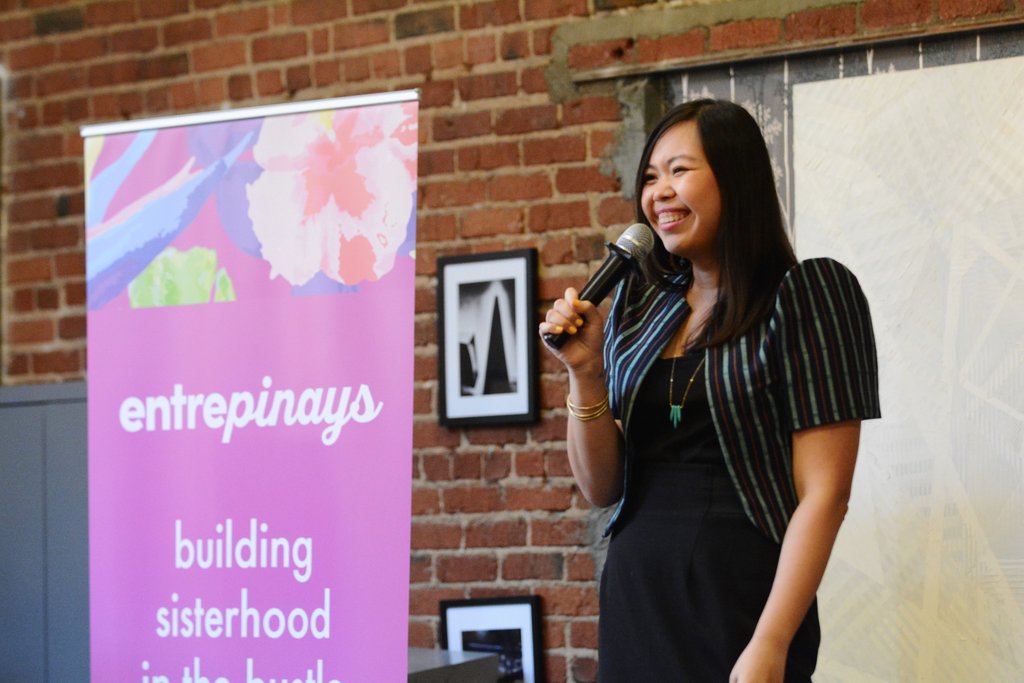
Together we spanned across industries - from professional services to e-commerce and retail to the nonprofit space. There were aspiring entrepreneurs, established career professionals, CEOs and founders from companies big and small and scaling.
I had attended the summit in 2018 as a lightning speaker to share what I learned about grit. It was the first time the summit ever took place, and I was floored by the magnetic energy and vibe in the room. Coming back for the second year, this time as a workshop facilitator, I was hit by how much larger and more extravagant this year’s summit was, but the vibe hadn’t changed.
It was a weekend still focused on sisterhood and supporting one another, helping each other through the ups and downs of the entrepreneurial journey as Pinay women. And it was also a summit about decolonization and feminism.
But it was also about so much more.
Even as you read through this article, you might be wondering why we need a summit for Filipina entrepreneurs in the first place.
When I tell friends and family that I had travelled all the way from Toronto to San Francisco to attend a Pinay entrepreneur summit, I’m met with surprise.
“That’s so… specific,” they say. And in their pause I can hear the question.
Why do we need an entrepreneur summit for Filipinas? Are our needs really all that different from other women entrepreneurs, or other communities of colour? Do we really need something just for us?
I had asked myself the same questions. And after this year’s summit, I can confidently say that the answer is a big resounding yes.
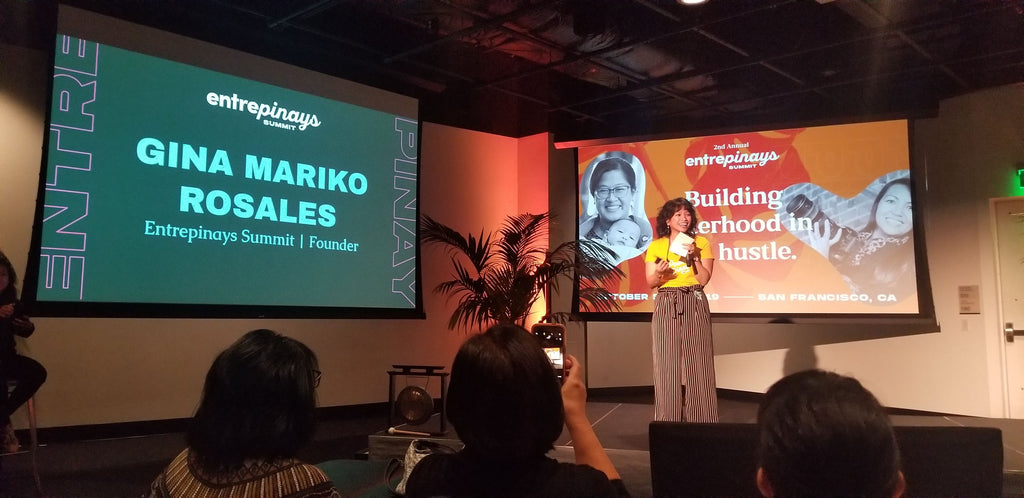 Gina Mariko Rosales, founder of Make It Mariko Events and the Pinayista Summit, opens the weekend with a heartfelt welcome. Photo by Leilani Salcedo.
Gina Mariko Rosales, founder of Make It Mariko Events and the Pinayista Summit, opens the weekend with a heartfelt welcome. Photo by Leilani Salcedo.
Unthreading Our Community’s History
One thing we never talk about in other entrepreneur spaces is the historical context of colonialism and racism, and how these roots take hold and seep into everything, including today’s modern business landscape.
Women of colour, for example, have much more difficulty getting access to credit and financing compared to their white counterparts. The challenge compounds if you’re a woman of colour who identifies as LGBTQ+ or has a disability, or both. And since the current systems in place benefit people already in power (read: rich, white men), people of colour and women continue to be shut out of economic opportunities.
This sounds like heavy stuff, and it is. But I loved how the summit ebbed and flowed, with many moments of lightness and joy filling the spaces in between as together we all unpacked our shared history, struggles, and triumphs.
For example, I attended a personal budgeting workshop led by Berna Anat of HeyBerna, affectionately calling herself ‘your financial hype woman’. I had been following Berna’s work for the past year after she wrote an article called ‘Too Dark & Not Enough: Traveling As A Dark-Skin, Curly Haired Filipinx!
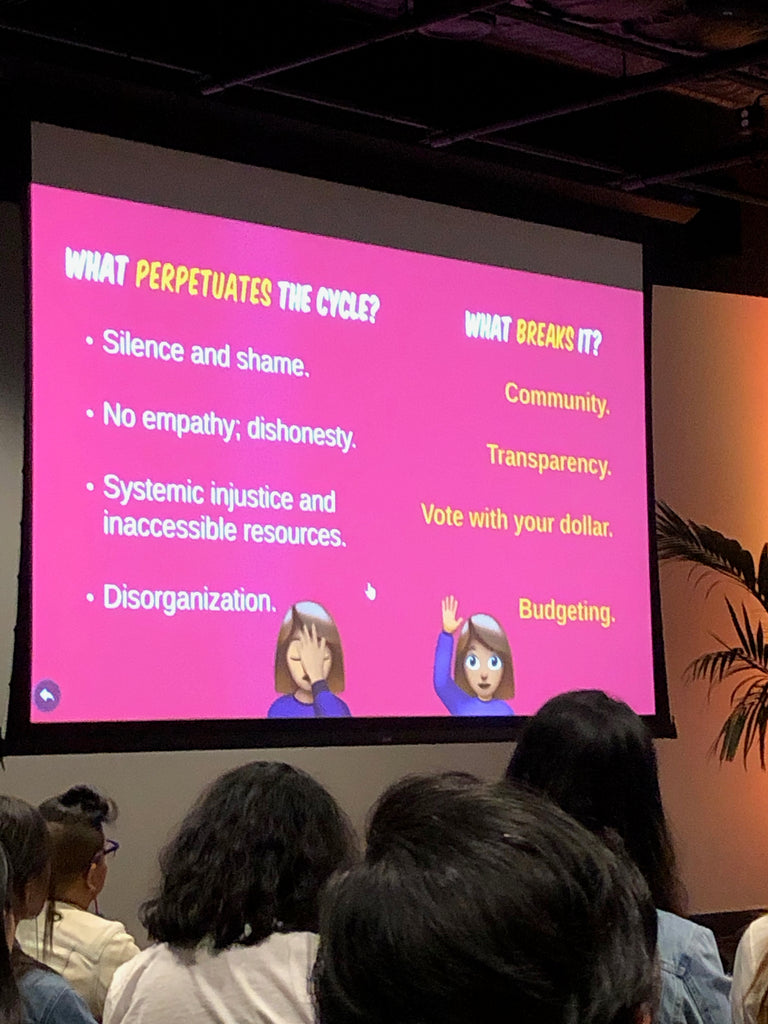
The Pinayista Summit was full of insightful and deep workshops, including Brown Girl Budget facilitated by financial hype woman, Berna Anat of HeyBerna.
Her workshop was lighthearted and funny and engaging. We laughed about the eccentric financial advice we all received from our Filipino families growing up. One woman shared how her Lola would hide her money inside a Jesus statue. Another confessed her parents told her to never trust credit cards.
I had my own frustrations with my parents. Growing up, it never made sense to me how they would preach about frugality and not wasting money, yet this wisdom would fly out the door whenever there was a sale and that for some reason it’s okay to have three refrigerators in a house for only two people.
Berna helped us unpack all this - about the ‘Filipino frugal-flex’ complex (the need to show off material success while living in fear of wasting money) and about the history of the banking system in the Philippines.
She talked about how colonial structures shaped Filipinos relationship with money, how the US purposely bombed all of Manila’s financial institutions during World War II, and how governments and corporations kept people poor.
We learned that 59% of Filipinos worldwide currently don’t have bank accounts. This coincides with my own work in social enterprise in the Philippines - learning how the majority of Filipinos in the country are considered ‘unbanked’, lacking access to credit and even chequing accounts within which to securely keep their money, and that many of them have never had savings in their life.
“It’s not that my family was materialistic,” Berna shared. “It’s that they themselves grew up with such scarcity they never wanted to feel that way again.” With that, many of us in the audience nodded along.
Another session I attended was a public speaking workshop by Ning Recio, a professional voice actor, consultant, and public speaker. We learned tangible ways to improve our public speaking, but one of the most valuable parts of her workshop was understanding the forces that prevent Filipina women from speaking up in the first place.

From left to right: Ning Recio, Jennifer Navarro-Marroquin of Community Well, Dr. Allyson Tintiangco-Cubales of Pin@y Educational Partnerships (PEP) with a photo in memory of Dr. Dawn Mabalon, Allison Tinati aka Hueman, Angelia Trinidad of Passion Planner, Melody Lorenzo of Sweet Condesa Pastries, Nadia de Ala of Nadia de Ala Coaching, Berna Anat of HeyBerna, and Gina Mariko Rosales of Make It Mariko. Photo by Diana Brieva.
Many women in the room confessed that they were afraid of being too loud or considered ‘too much’ or ‘too extra’, as our Filipino parents often told us to keep quiet and not draw too much attention to ourselves.
“I hate how people seem surprised that I know things,” one of the attendees shared. “Especially older men, they always assume I’m not smart or knowledgeable.”
This can be tied back to the hypersexualization and objectification of asian women in the media, or the expectation that we’re supposed to be subservient and meek otherwise we’re bitches. Or that Filipinas are considered mild-mannered, honest, and hard working, but we’re never seen as leaders.
These were moments I loved and appreciated so much at the summit. By taking time as a community to unpack our history and look at the bigger picture, we were able to see our challenges more clearly, but were also able to look at our families and ourselves with more empathy, kindness, and understanding.
Serving Ourselves Versus Our Communities
As women, we’re expected to be everything to everyone. We’re supposed to be smart and talented CEO’s who are also friends with our employees, doting partners, caring mothers, active volunteers, and expert homecooks. There’s no wonder why self-care is always a major theme of any women entrepreneur community.
The context, however, by which we discussed it at the Pinayista Summit was very different.
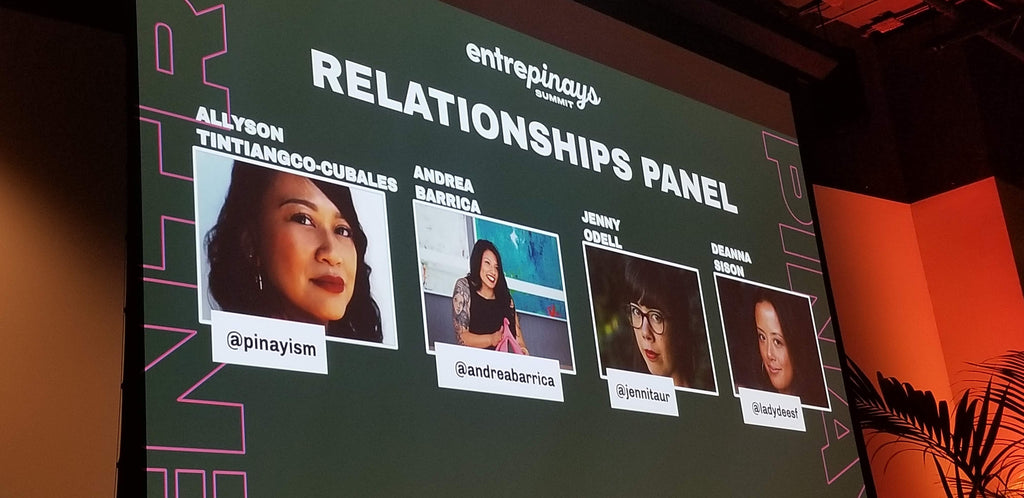
The Relationships panel at the Pinayista Summit consisted of Allyson Tintiangco-Cubales of Pin@y Educational Partnerships (PEP), Andrea Barrica of O.School, Jenny Odell, and Deanna Sison of MestizaSF. Photo by Leilani Salcedo.
One of the summit panels focused on the theme Relationships and how we in our community manage relationships with the people around us and with ourselves.
On the panel was Andrea Barrica. Andrea is founder of O.School, an online technology education platform that aims to destigmatize self pleasure and sex for women. When asked about her relationship with herself, she confessed that she’s traditionally been a poor self nurturer.
“I’m good at nurturing others but not myself,” she shares. “The women in my family are the same. As Filipinas we always belong to someone else - we belong to our parents, then our husbands, and then our children.”
When do we ever belong to ourselves?
I think about my wedding day, when I had invited my fiance’s mother and aunt for a small lunch before the ceremony so they could get to know my mom better. In typical fashion, my mom insisted on fussing about the food and the cleaning that she just missed the whole lunch and barely interacted with my now mother-in-law.
I can’t help but contrast this to my white friends and their parents. I distinctly remember a scene at my friend’s engagement party - her mom and future mother-in-law seated in the living room barefoot with their legs curled up on the chairs, sharing a laugh over glasses of wine. One of them had smiled at me as I came in the room, kindly inviting me to help myself to a glass of wine and make myself at home.
I’ve begun to notice that I replicate many of the same behaviours as my mom. When we have friends over for dinner, I worry about the food and whether the kitchen is clean, having to stop myself from doing the dishes in the middle of dinner as I had seen the women in my family do so often.
Andrea talked about how she’s made it a priority to care for herself in the ways she knows how, like through self pleasure. “The key is in doing something for yourself that’s not goal oriented,” she said. “Productivity itself is a colonialist and capitalist concept.”
But what does it mean to serve ourselves as Filipinas when our personal goals tie so deeply with the greater good?
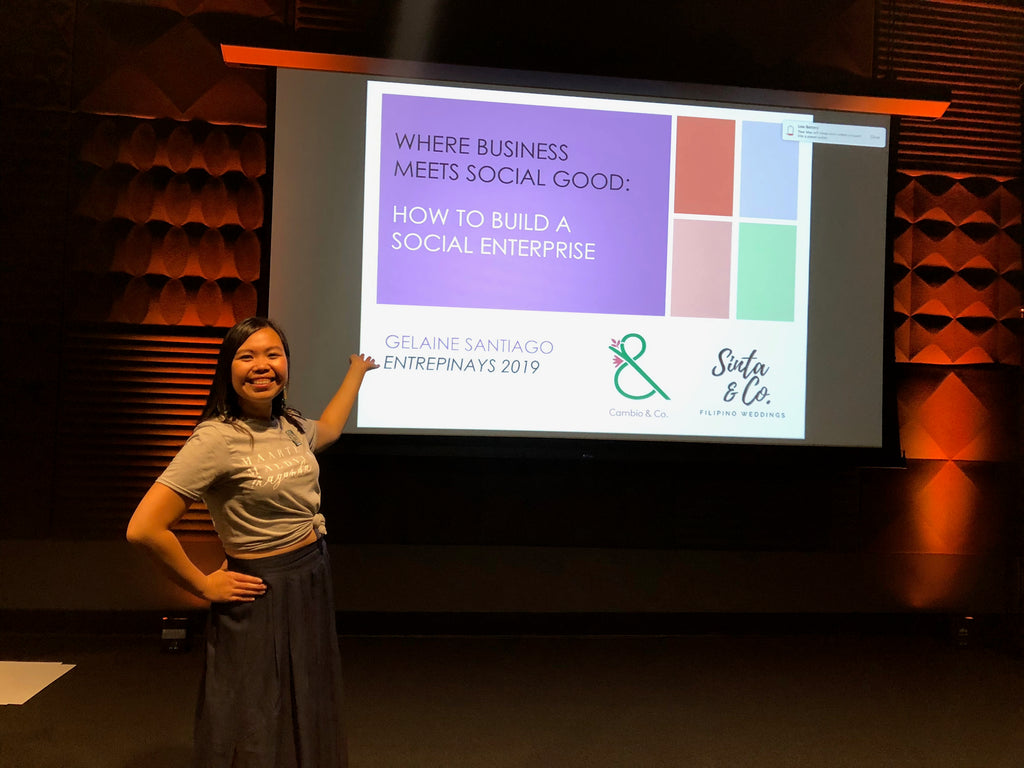 I facilitated a workshop on behalf of Cambio & Co. and Sinta & Co. at the Pinayista Summit to talk about social impact and social enterprise - specifically, how can we create meaningful, sustainable impact within our organizations?
I facilitated a workshop on behalf of Cambio & Co. and Sinta & Co. at the Pinayista Summit to talk about social impact and social enterprise - specifically, how can we create meaningful, sustainable impact within our organizations?
What strikes me at the Pinayista Summit is that every single person I spoke with wasn’t there to make more money or become famous. Every conversation I had was charged with an underlying current of service - of how can we create businesses that better serve our communities and benefit others as a whole?
That was actually the reason I was at the summit in the first place.
I was selected to facilitate a workshop called ‘Where Business Meets Social Good’. I talked about how the businesses we create can be a powerful force to change the world for the better.
60 Filipinas attended my workshop, and together we talked about how our businesses can go beyond the traditional for-profit model, and create new kinds of businesses that foster long-term and sustainable impact at every level of the organization instead.
Many people came up to me after my workshop, sharing their dreams to create a business that gives back to the Philippines and creates opportunities for others back home.
It was all music to my ears, especially since I had so often shared the same dream at other entrepreneur spaces and been met with deafening silence or, worse, a condescending response.
How is it that this conference just gets me?
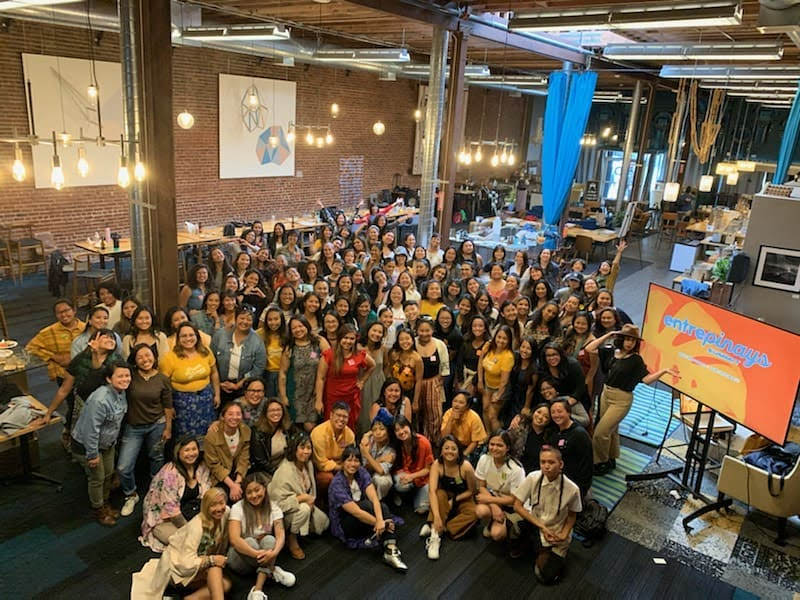 The Pinayista Summit brought together 265 self-identified Filipina/Pinay/Pinxy entrepreneurs and career professionals across the USA and Canada. I was struck by the diversity within our community and the common threads that united us. Photo by Pinayista Summit.
The Pinayista Summit brought together 265 self-identified Filipina/Pinay/Pinxy entrepreneurs and career professionals across the USA and Canada. I was struck by the diversity within our community and the common threads that united us. Photo by Pinayista Summit.
Coming To Terms With Our Own Privilege As Filipinas
In the same way that self-care within the Filipina community looks inherently different, privilege in our community also has a different face.
The theme of privilege and obligation came up often, in many different forms and through many different talks throughout the summit.
Since the Pinayista Summit took place in San Francisco, a city with the highest rent costs in all of North America and with Silicon Valley just outside of the city’s borders, many of the attendees and speakers were former tech veterans who quit their lucrative yet unfulfilling jobs in search for something more: purpose and fulfillment.
For many children of immigrants whose parents scraped and saved and hustled at minimum wage jobs well below their skill set, we all carry a burden. In Filipino, it’s known as utang na loob (translated as ‘inner debt’), encapsulating the debt we owe to our parents and ancestors and our responsibilities to make their sacrifices worthwhile so we could pursue a better life.
To quit a stable if unsatisfactory job in pursuit of purpose and fulfillment (as I and my fellow Pinays have done) seems frivolous and, worse, ungrateful.
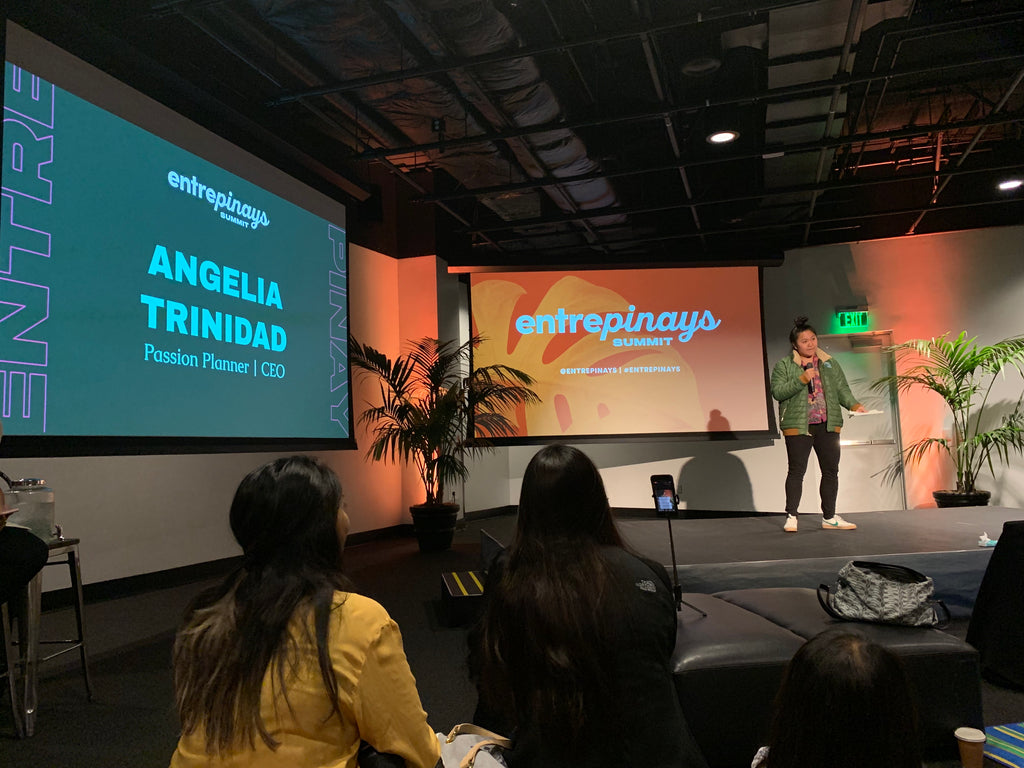 Angelia Trinidad, founder of Passion Project, talks about her journey as a Filipina entrepreneur and how she pursued her dreams despite the obstacles. Photo by Diana Brieva.
Angelia Trinidad, founder of Passion Project, talks about her journey as a Filipina entrepreneur and how she pursued her dreams despite the obstacles. Photo by Diana Brieva.
Angelia Trinidad, founder of the Passion Planner, talked about how her company reached one million dollars in revenue following two successful Kickstarters. She shared about her mother being resistant to her starting a company.
“When are you going to get a real job?” Angelia quoted her mom in her lightning talk during day one of the summit.
Those of us in the audience laughed along, if only to release painfully similar experiences we had with our own families. Angelia talked about how her mom would have preferred her to become a nurse or something more conventional.
With Passion Planner in an upward trajectory and a growing base of employees, Angelia beamed with pride when she shared that she’s been able to offer benefits to every single one of her team members and also incorporated a corporate social responsibility program into her company.
Because of her own successes as an entrepreneur, ‘now I’m able to give my mom the life she deserves,” Angelia said as the audience cheered.
These are all topics everyone in the room understood inherently, and felt deeply.
They were also topics that would never have existed or been acknowledged had this been any other space.
Why The World Needs More Pinayista Summits
As the world evolves and gets “more woke”, diversity is a word that gets sprinkled in. But like the actor Riz Ahmed eloquently said, there’s a difference between diversity and representation.
Representation - when it’s genuine, meaningful, and not an afterthought - matters.
As Dr. Allyson Tintiangco-Cubales, founder of Pin@y Educational Partnerships and professor of Ethnic Studies and Educational Leadership at San Francisco State University, said so eloquently at the summit, “It’s important to put Pinays in the centre, because we are always at the margins - at the margins of mainstream society, at the margins of asian culture, of our own community, and sometimes even at the margins of our own families.”
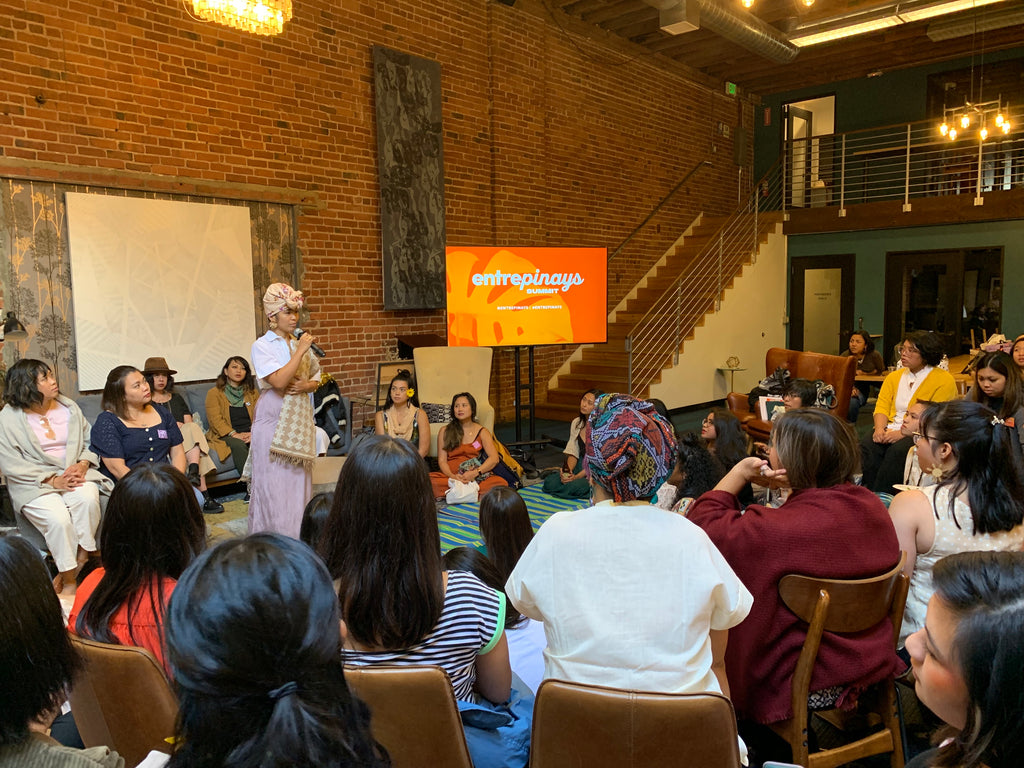
Closing circle at the Pinayista Summit. Photo by Diana Brieva.
I loved that at the Pinayista Summit, I got to see myself reflected in many of the stories. But I especially loved that I got to hear stories that were very different from mine, too.
I was reminded again of the diversity in our own community, and that as Filipinas, we’re united in our shared experiences, but we’re also far from being a monolith.
Some of us are black and dark-skinned while others are white-passing. Some of us grow up with immense scarcity while some grow up with abundance. Some of us are queer and some of us are nonbinary. Many of us have gone through similar questions, asking ourselves at some point in our lives, “Are we Filipino enough? Are we good enough?”
Rather than allowing ourselves to be lumped into the margins of mainstream society, instead we gather our collective voices and demand ourselves to be heard, if by no else but us.
At the end of the day, the Pinayista Summit isn’t significant because it makes you a more successful entrepreneur, or even a more informed feminist.
The significance of the Pinayista Summit and spaces like it lies in the fact that it simply exists.
Gelaine Santiago
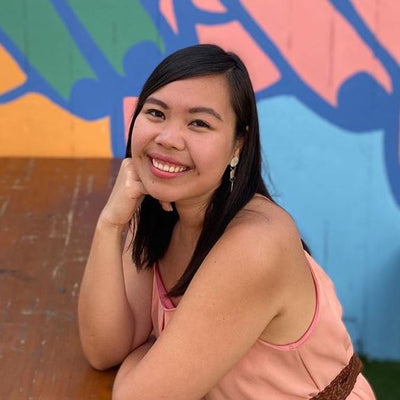
Gelaine is a social entrepreneur, an online storyteller, and a passionate advocate for diversity and ethics in business. She’s the co-founder of Cambio & Co., an e-commerce fashion company working with Filipino artisans to celebrate Filipino craftsmanship, culture, and heritage. Gelaine is also one of the founders of Sinta & Co., the world’s first conscious Filipino wedding boutique. She was named one of RBC’s Top 25 Canadian Immigrants of 2019. Find her on Instagram @gelainesantiago and www.gelainesantiago.com



It was tough knowing this year I would not get to attend the Entrepinays summit. Reading this allows the depth of love, pain, and realizations express itself again for those of us who miss and long for this kind of experience and connection. Thank you for sharing so intimately your picture, our picture, and the big picture in the context of your heart and thoughts. This means so much, and you mean so much <3
Leave a comment